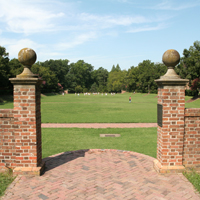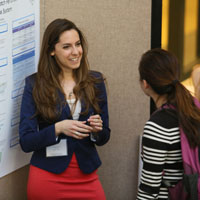
William & Mary's Committee on Sustainability has announced its Spring 2015 Green Fee Awards.


William & Mary's Committee on Sustainability has announced its Spring 2015 Green Fee Awards.

Elizabeth Pelletier, a Public Policy major and 2014 Phi Beta Kappa graduate of William & Mary, has received the Best Undergraduate Poster Award for her poster presented at the 2014 annual meeting of the Midwest Political Science Association (MPSA).

The Graduate Research Symposium will be held at the Sadler Center March 20-21, 2015.

W&M News talks with Assistant Professor of Economics Nicholas Sanders about his new study and how a team's participation in the Super Bowl can lead greater transmission of flu among their fans.

The College of William and Mary’s Thomas Jefferson Program in Public Policy traces its roots to the leadership and passion of this nation’s Founding Fathers. The competitive program only admits 25 students a year into it’s Master’s in Public Policy program, ensuring that the brightest and most ambitious students develop a close-knit community and close relationships with faculty. The public service school places 73rd on U.S. News’ list of best programs, and offers such innovative opportunities as the Friday Policy Dialogues, Policy Research Seminars, and an Alumni Mentoring Program. Bachelor’s degree students will also be happy to hear that the department encourages and provides many resources for undergraduate research.

Major party competition for the nation’s more than 5,800 state legislative seats up for election has dropped again this year, falling to its lowest level in the past seven federal election cycles.

An active partnership between the U.S. State Department and William & Mary, the Diplomacy Lab continues this year with multiple projects sponsored by the Institute for the Theory & Practice of International Relations, including the Project on International Peace & Security (PIPS), AidData, Reform Incentives and the Center for African Development (CAD).

Graduate student Isaac (Ike) Irby of the Virginia Institute of Marine Science recently returned from Washington D.C. where he spent his summer working with the nation’s top scientists within the Executive Office of the President’s Office of Science and Technology Policy (OSTP).

As a joint degree student working towards an MPP at the Thomas Jefferson Program and a PhD at the Virginia Institute of Marine Science, I am interested in science advisory and the process of science policy development at the national and international levels.

WASHINGTON, DC – Today, President Barack Obama announced his intent to nominate the following individuals to key Administration posts.

According to scholars on both sides of the health aid debate, the debate is over. Those who declare that health aid works and those who maintain that health aid fails both claim consensus. How can this be?